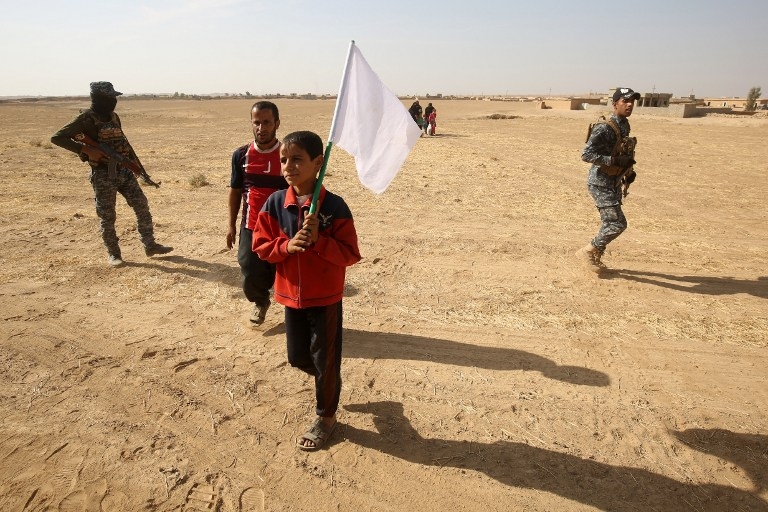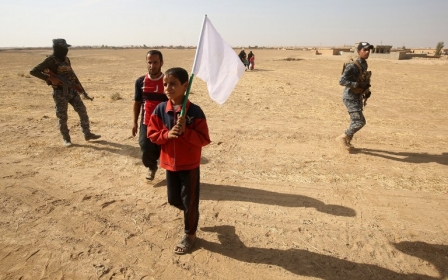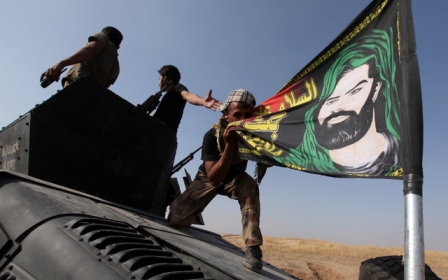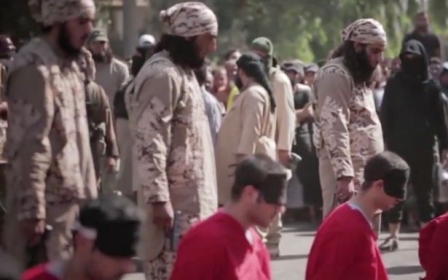IS leaders flee Mosul as Iraqi forces close in

Islamic State (IS) group leaders have been fleeing Mosul as US-backed local forces close in on the militants' last Iraqi stronghold, a US general said on Wednesday.
US Army Major General Gary Volesky, who heads the land component command of the US-led coalition to defeat IS, predicted that foreign fighters will end up forming a large contingent of militants remaining in the city, as they have nowhere else to go.
An estimated 3,500 to 5,000 IS militants are dug into Mosul, while tens of thousands of Iraqi forces have massed to recapture Iraq's second largest city in an offensive that began on the outskirts on Monday.
"We are telling Daesh that their leaders are abandoning them. We've seen a movement out of Mosul," he told reporters in a video briefing from Baghdad, using an Arabic acronym for IS.
He declined to say how many leaders had left, when they went, or where they were headed, but said they were targeted with air strikes as they fled.
"Where they are going, I will leave that to our [missile] targeteers to take care of," Volesky said.
He noted that the Iraqis would screen anyone leaving Mosul, and attempts by foreign fighters to blend in to an expected exodus of displaced people would be thwarted.
"It's difficult for them to blend into the local population based on the number of different types of foreign fighters that there are," Volesky said.
"We expect that they will be the ones [who stay and fight], because they really don't have any other place to go."
Also on Wednesday, the US said that the coalition will not support Shia militias who might seek to participate in the campaign to retake Mosul from IS, stressing that it is up to Baghdad to decide their role.
"It's difficult for them to blend into the local population based on the number of different types of foreign fighters that there are"
Launched on Monday, the long-awaited advance on Mosul was making quick progress, but US President Barack Obama joined a chorus of warnings that the battle ahead would be tough.
Officials have also warned that the hundreds of thousands of civilians still in the city could be used as human shields.
Washington expects IS militants to use crude chemical weapons as they try to repel the Iraqi-led offensive, although US officials said the group's technical ability to develop such weapons is highly limited.
US forces have begun to regularly collect shell fragments to test for possible chemical agents, given the use of mustard agent by IS militants in the months leading up to the Mosul offensive, one official said.
In a previously undisclosed incident, US forces confirmed the presence of a sulphur mustard agent on IS munition fragments on 5 October, a second official said.
IS militants had also targeted local forces, not US or coalition troops.
"Given ISIL's reprehensible behaviour and flagrant disregard for international standards and norms, this event is not surprising," the second official told Reuters, speaking on condition of anonymity, and using an alternative acronym for the IS group.
Separately, General Joseph Votel, who heads the US military's Central Command, warned that the battle for Mosul would last for weeks to months.
"This is going to be a complex fight," Votel told a Washington think tank.
"The Islamic State has had two years to prepare this area. We should expect there will be some setbacks. We expect that there will be some very heavy fighting."
"We don't respect their ideology, but we respect them as an adversary. They are working diligently to try to come up with new ways that they can have an impact on us."
"This is going to be a complex fight"
Late on Tuesday, the Shia-dominated Popular Mobilisation Units (PMU), a paramilitary coalition of mostly Iranian-trained militias, said it would support the Iraqi army's offensive west of Mosul, raising fears of sectarian strife in the mainly Sunni region. The announcement came despite warnings from human rights groups that involvement of the PMU could ignite violence.
"As far as the Shiite PMF, the coalition only supports those elements that are under the direct command and control of the Iraqi security forces - and the Shiite PMF are not," said Volesky, using a different acronym for the PMU.
This article is available in French on Middle East Eye French edition.
New MEE newsletter: Jerusalem Dispatch
Sign up to get the latest insights and analysis on Israel-Palestine, alongside Turkey Unpacked and other MEE newsletters
Middle East Eye delivers independent and unrivalled coverage and analysis of the Middle East, North Africa and beyond. To learn more about republishing this content and the associated fees, please fill out this form. More about MEE can be found here.




